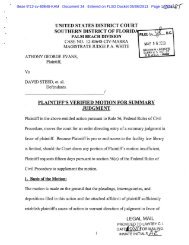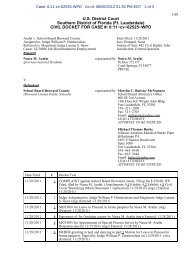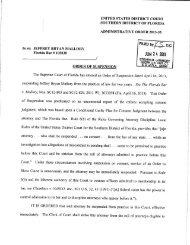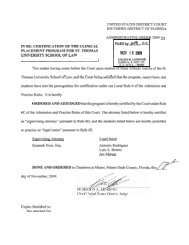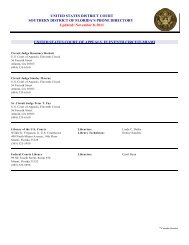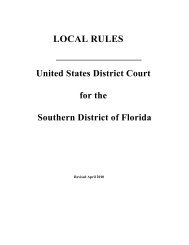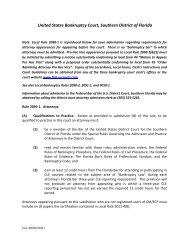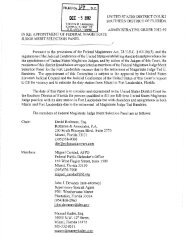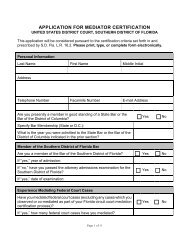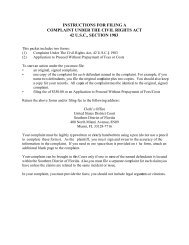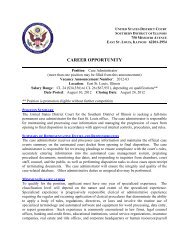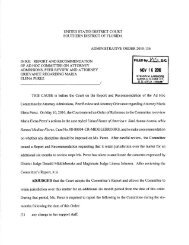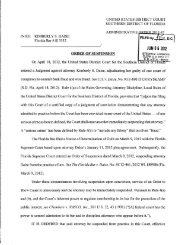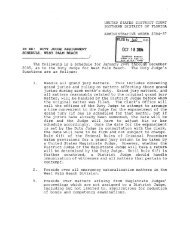JAN j 6 2010 - United States District Court
JAN j 6 2010 - United States District Court
JAN j 6 2010 - United States District Court
You also want an ePaper? Increase the reach of your titles
YUMPU automatically turns print PDFs into web optimized ePapers that Google loves.
B^-(B) Motions for judgment on the pleadings;<br />
Motions for summary judgment;<br />
Motions to dismiss or permit the maintenance of a class action;<br />
E.(E) Motions to dismiss for failure to state a claim upon which relief may be<br />
granted;<br />
Motions to involuntarily dismiss an action;<br />
Motions for review of default judgments;<br />
Motions to dismiss or quash an indictment or information made by a<br />
defendant; and<br />
3—(X) Motions to suppress evidence in a criminal case.<br />
(2) A Magistrate Judge may determine any preliminary matters and conduct any<br />
necessary evidentiary hearing or other proceeding arising in the exercise of<br />
the authority conferred by this subsection.<br />
(e) Prisoner Cases Under Title 28, <strong>United</strong> <strong>States</strong> Code, Sections 2254 and 2255.<br />
A Magistrate Judge may perform any or all of the duties imposed upon a <strong>District</strong><br />
Judge by the rules governing proceedings in Title 28, <strong>United</strong> <strong>States</strong> Code,<br />
Sections 2254 and 2255. In so doing, a Magistrate Judge may issue any<br />
preliminary orders and conduct any necessary evidentiary hearing or other<br />
appropriate proceeding and shall submit to a <strong>District</strong> Judge a report containing<br />
proposed findings of fact and recommendations for disposition of the petition<br />
by the <strong>District</strong> Judge. Any order disposing of the petition may only be made by<br />
a <strong>District</strong> Judge.<br />
(f) Prisoner Cases Under Title 42, <strong>United</strong> <strong>States</strong> Code, Section 1983. A<br />
Magistrate Judge may issue any preliminary orders and conduct any necessary<br />
evidentiary hearing or other appropriate proceeding and shall submit to a<br />
<strong>District</strong> Judge a report containing proposed findings of fact and recommendation<br />
for the disposition of petitions filed by prisoners challenging the conditions<br />
of their confinement.<br />
(g) Special Master References. A Magistrate Judge may be designated by a<br />
<strong>District</strong> Judge to serve as a special master in appropriate civil cases in<br />
accordance with Title 28, <strong>United</strong> <strong>States</strong> Code 636(b)(2) and Federal Rules of<br />
Civil Procedure 53. Upon the consent of the parties, a Magistrate Judge may be<br />
designated by a <strong>District</strong> Judge to serve as a special master in any civil case,<br />
notwithstanding the limitations of Federal Rule of Civil Procedure 53(b).<br />
(h) Conduct of Trials and Disposition of Civil Cases Upon Consent of the<br />
Parties-Title 28, <strong>United</strong> <strong>States</strong> Code 636 (c). Upon the consent of the parties,<br />
a full-time Magistrate Judge may conduct any or all proceedings in any civil<br />
case which is filed in this <strong>Court</strong>, including the conduct of a jury or nonjury<br />
trial, and may order the entry of a final judgment, in accordance with Title<br />
28, <strong>United</strong> <strong>States</strong> Code 636(c). In the course of conducting such proceedings<br />
upon consent of the parties, a Magistrate Judge may hear and determine any and<br />
all pre-trial and post-trial motions which are filed by the parties, including<br />
153



